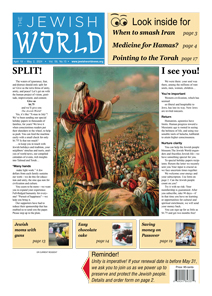At a Oct. 23 2023 protest at UC Berkley, protestors hold up Israel’s and Palestine flags. Photo courtesy of Kefr4000 via Wikipedia commons
By MATTHEW SCHUTZ
JNS
The Hamas’ Oct. 7 massacre was understood by all decent people to be a crime against humanity.
For less-than-decent people, it was understood as an invitation to get in on the carnage. As the Hamas terrorists blasted through Israel’s billion-dollar barrier fence, it was as if they had managed to also tear down the invisible force fields of shame and restraint that we once imagined protected Jews in America from the most abject forms of bigotry and discrimination. This was most prominently seen on college campuses, and it began almost immediately. On the morning of Oct. 7, as the Israel Defense Forces was still fighting to regain control of Israel’s southern towns and dead bodies still lay abandoned in Hamas’s killing fields, student activists at Harvard drafted a letter that held “the Israeli regime entirely responsible for all the unfolding violence.”
It has been signed by 35 different student organizations.
Institutional Rot?
In the days that followed, campus activists rallied to support Hamas’s “freedom fighters” and denigrate Israel’s response—which had not yet begun—as genocidal. Many media personalities and pundits condemned this phenomenon, but also fundamentally misunderstood it as an expression of sophomoric ignorance rather than institutional rot. As we would soon learn, the problem extended to the so-called adults in the room as well.
The past months have produced disturbing images that will haunt Jews for decades to come. Among them is the image of three college presidents from elite universities, mocking smiles on their lips, deflecting questions about whether or not calling for the genocide of Jews constitutes a breach of their schools’ respective codes of conduct.
“Context”
“It is a context-dependent decision,” UPenn’s Liz Magill said, days before the fallout from the congressional hearing at which the remarks were made led her to resign. A month later, tainted by the scandal of the hearing in addition to an ever-growing heap of plagiarism accusations, Harvard’s Claudine Gay would be ousted as well. However, the damage was done. A message had been broadcast to the world. Violent rhetoric against Jews would not be condemned, but rather examined for “context.”
Jewish College Concerns
This was merely a reiteration of what anti-Israel student activists had been saying about Hamas’s attack. Whether dealing with physical violence or genocidal rhetoric, “context” would be invoked to minimize and dismiss the concerns of Jewish students.
For Jewish high school students and their families preparing for college application season, this added a disturbing new dimension to an already stressful process. I posted a message to a Facebook group called Mothers Against College Antisemitism (MACA) and received a deluge of responses from parents and college counselors who have spent the past four months rethinking their options.
“Mira Andrews” (she requested a pseudonym), an independent educational counselor who mostly works with Jewish families, has been working to help students reshape their college lists to avoid schools where toxic anti-Semitism has been most flagrant. One school that’s been largely ruled out is Barnard, which she described as being essentially “the same as Columbia.” Columbia, for those who don’t know, has become a watchword for aggressive anti-Zionism. Jewish students have been harassed and even physically assaulted for supporting Israel, and pro-Palestinian protests at the gates of the university have featured signs that say “Israel the new Nazi Germany” and “Israel steals Palestinian organs.” An alleged incident in which anti-Zionists protesters were sprayed with a foul-smelling substance has further inflamed passions.
Andrews’ daughter, however, is planning to start at Barnard in the fall. Having been accepted early, before Oct. 7, she is determined not to be scared away from her dream school—a decision,which her mother views with pride and concern. “It’s sad that her huge accomplishment has now been tainted, but she believes that Barnard needs strong Jewish voices,” she said.
Parents Perplexed
Most of the parents I spoke to seemed genuinely rattled. “My high school senior has been auditioning for theater and musical theater programs,” said Stephanie Abramowitz of Calabasas. “She’s always concerned about mentioning she’s Jewish or that her dad’s Israeli.”
Some parents were eager to tell me that the problem pre-existed Oct. 7. “Jewish families have been factoring campus anti-Semitism for Jewish students into their decisions for decades,” wrote Emilia Green. “My daughter is a freshman in college this year and we ruled out schools based on blatant anti-Semitic attitudes/actions/anti-Israel graffiti, etc.”
Abby Moskowitz was already worried about campus anti-Semitism before Oct. 7, but the ensuing outburst of anti-Zionist sentiment convinced her that she needed to take a more active role. “We took Columbia off the list as well as UCLA, which is sadly my alma mater. My son’s first choice was WashU…We met with the Hillel there and they are amazing. He felt super comfortable there. Thankfully he was accepted,” she said.
I was also curious to know if any of the parents in the group were concerned not that their children would become targets of anti-Zionist harassment, but that they would join the ranks of anti-Israel student groups like Jewish Voice for Peace or Students for Justice in Palestine. I was surprised, after having received so many responses to my first question, by the silence that met this second one. Perhaps, I wondered, these parents don’t want to admit that their children may come home from school with radically altered politics. Or perhaps they simply feel confident that their children’s Israel education could weather the storm.
Treatment Changes
For students who entered college before Oct. 7, the result has been a sudden and dramatic shift in how they feel on campus.
Tali, at University of Colorado, Boulder, reports a noticeable shift in how she is treated.
“I wear a chai necklace and sometimes a Magen David as well. Strangers on campus have definitely stared at my necklaces in ways that made me feel unsafe,” she said, adding, “I’ve never had an experience like that on campus before Oct. 7.” At campus protests she sees signs that read “Zionism is genocide” and “Keep the world clean” with images of Israeli flags tossed in garbage cans. When I ask her if campus anti-Semitism played any role in her college decision-making process, she says no, but that it would if she were applying today.
Mix Of Emotions
Hannah Levy, from Silver Spring, Md., enrolled at Tel Aviv University as part of a joint program with Columbia. “We do our first two years here and the next two years at Columbia, so naturally a lot of people in the program have been seeing what’s going on and getting quite nervous,” she said.Many campus activists at Columbia have focused their attention on the very program in which Hannah is enrolled, trying to pressure the college to end its partnership with TAU. Hannah, however, isn’t too afraid. “Reports of anti-Semitism can be overblown to push a certain narrative,” she said.
When I asked how the rest of her cohort feels about the matter, Hannah told me that some are afraid to go while others are eager to play a role in combating anti-Semitism and anti-Zionism at Columbia. “I feel like I have a role to play too in pushing back on the narrative there, but not in a radically pro-Israel way. More of a balanced and nuanced approach. And there’s a lot of repression of pro-Palestinian voices at Columbia too,” she said.
There were those I spoke to who had decided to radically jump the track. One girl had abandoned college plans to join the IDF. One father told me that his daughter had opted for college in Europe, where she felt the environment would be less politicized around Israel.
I also made a trip to Herzliya to visit Reichman University, formerly known as IDC Herzliya, a small private university known for its large population of international students. There, I sat down with five students from the U.S. to discuss what inspired them to get their degrees in Israel. The students were representative of a particular demographic of American Jewry. Whether from the Orthodox world or not, they had grown up with strong Jewish educations and several of them had at least one Israeli parent.
When I asked if their decision to study at Reichman was rooted in concerns about campus anti-Semitism, they suggested that this was only a small part of the equation.
“It’s good to be studying around like-minded people,” said Daniel, who studies communications. “It’s a safe place.” The idea that Israel, in the wake of the worst terror attack in its history and in the midst of a brutal war, would be thought of as a “safe place” should be a worrying indication of how Jewish students view American campuses, but is not necessarily a surprising one. More than fear of anti-Semitism, the students I spoke to seemed to have been motivated mainly by a love of Israel and a desire to be among people with whom they could relate, which for this group meant people who had dual Israeli American identities.
Comparison Shopping
Talking with these students, I was reminded of the people I had studied with during my year abroad in Jerusalem in 2009. I grew up in a thoroughly secular Jewish home in Massachusetts where Zionism and Israel had never been topics of conversation. In this, I was a complete outlier on my program. Everyone else had gone to Jewish day school and Jewish summer camp and had been on trips to Israel with their families over the years.
Recalling this, I wondered if Reichman University was interested in reaching out to potential students who didn’t fit the mold. After all, anti-Semitism isn’t the only crisis rocking the world of higher education right now. There’s also the exorbitant expense and the diminishing returns of obtaining a college degree in the United States. That’s not to say that college isn’t “worth it,” merely that the equation has changed. Enter Reichman, which costs $16,000 a year for international students. This is quite high compared to Israeli public universities, which cost about $4,000 a year, but it’s a steal compared to the $50,000 price tag attached to a single year at many American institutions. Moreover, the degrees are practical and career-focused and can be finished in just three years.
I asked Jonathan Davis, vice president for external relations and head of the Raphael Recanati International School, if he planed to expand outreach in the wake of Oct. 7. I felt sure that many Jewish parents would be interested in hearing about an English-language option in Israel that costs a fraction of the price of an American school. When I asked this, however, Davis essentially just said that “they know we’re here,” indicating that there are no real plans in place to increase outreach or to market the school to disenfranchised Jewish students who increasingly feel that they have no good options.
If we take a broad historical view, we might see what’s happening now not as a new crisis, but rather as the return of the previously existing state of affairs. For decades, American college campuses were hostile to Jewish students in ways that were both institutionalized and cultural. Notably, the widespread practice of having Jewish quotas severely limited how many Jews could access the best schools. By the 1970s, Valerie Strauss writes in The Washington Post, “Jewish quotas were seen as a thing of the past and Jewish enrollment in U.S. higher education rose…Jewish students in the last part of the 20th century were largely comfortable on campus, with overt anti-Semitism displayed by administrators” all but gone.
Security, Learning
It was at the tail end of this golden age that I attended Sarah Lawrence College. I did not enter as a Zionist. Rather, it was because of my experience studying abroad in Jerusalem during my third year that I came to have a relationship with Israel at all. Later on I would immigrate to the country and start my life here.
I now wonder if any of that would have happened if I were a student today. Would I have felt comfortable applying to study abroad in “the new Nazi Germany?” Would my mind have been so filled with anti-Israel bias that I would be prevented ever getting the chance to learn what Israel is actually like with my own eyes?
The immediate concern on American campuses regards the safety of Jewish students, and rightly so. But there is another concern, which has to do with the mission of universities to foster independent and rigorous thought. Will students who, like me, come into college as blank slates on Israel get the chance to really learn about Israel and its history from a multiplicity of perspectives so that they can draw their own conclusions? This is what I was allowed to do, and I was allowed to do it in peace. I had debates about Israel with my peers and sometimes faced strong pushback for my views, but never taunting or harassment. Ultimately, this made me a stronger person and a more critical thinker. This is what college is for.
I wondered, as I spoke to the students at Reichman, if they felt that they could do the same. Perhaps the school was a place where they felt they could engage in respectful but complicated discussions about Israeli history and policy. But when I asked them if they had “hard” or “complicated” conversations about the Israeli-Palestinian conflict, they seemed confused by the question.
“We’re like a parochial school,” Davis told me. “There are Catholic schools, there are Jewish schools and this is a Zionist school.” After my interview, I lingered on the Reichman campus. Like American campuses, it was a secluded world within a world, lush with greenery and lively with student life. I thought then of campuses in the United States, and the images of protesters planting Palestinian flags on the top of Chanukah displays or tearing down photos of kidnapped Israeli civilians. How strange that the peaceful campus is found here, in Israel, in the midst of an existential war while the turbulent campus is found in America, whose borders have never been crossed by invading armies.
Kohelet wrote that there is nothing new under the sun, and this isn’t new either. Jews have often been excluded from aspects of mainstream culture and their usual response has been to create their own opportunities. Excluded from the world of European theater, Jews created the Yiddish theater scene. Excluded from Harvard, Jews founded Brandeis. These alternative versions of mainstream cultural institutions allowed Jews to participate in safety and on their own terms. Ultimately, the fate of Jewish students rests on their ability to do this again. Whether that means creating a mass movement for Jewish students to earn their degrees in the ancient Jewish homeland, or investing their tuition and academic skills in new institutions in the United States has yet to be determined.
Originally published by The Jewish Journal.








